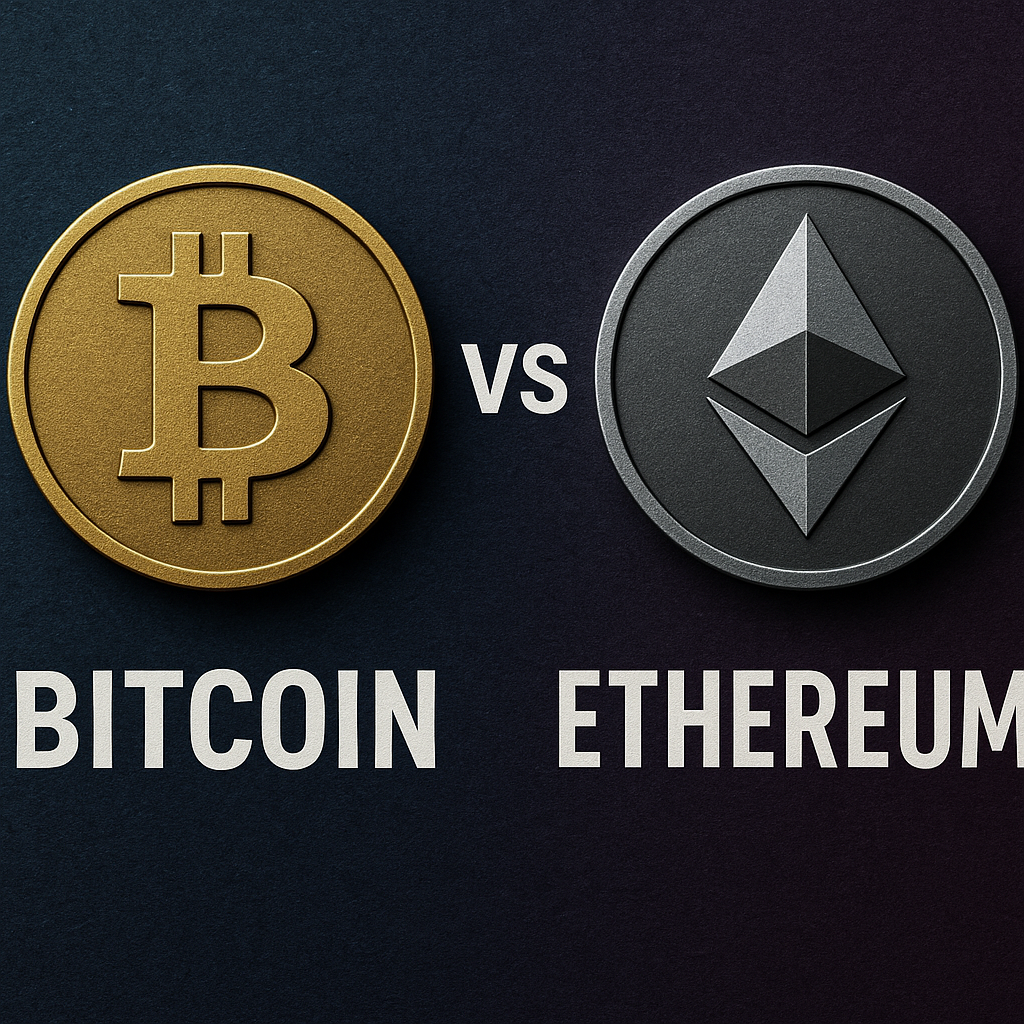Cryptocurrency Prices by Coinlib

Bitcoin vs Ethereum: Understanding the Key Variations and Similarities (2025 Information)
Within the quickly evolving world of digital finance, two names persistently dominate the dialog: Bitcoin and Ethereum. As the primary and second largest cryptocurrencies by market capitalization, they're usually talked about collectively—but their functions, designs, and use instances are very totally different.
Bitcoin, launched in 2009, is extensively referred to as digital gold. It was created to function a decentralized foreign money and a dependable retailer of worth, providing a hedge in opposition to inflation and monetary instability. Ethereum, launched in 2015, took blockchain know-how one step additional. As an alternative of being solely a digital foreign money, it turned a programmable platform that powers sensible contracts, decentralized purposes (dApps), decentralized finance (DeFi), and NFTs.
For newcomers and seasoned traders alike, the query stays: what actually units Ethereum other than Bitcoin? This text breaks down their origins, philosophies, applied sciences, use instances, and long-term outlooks—serving to you perceive why each are important pillars of the crypto ecosystem.
The Genesis of Bitcoin and Ethereum
Bitcoin Origins
Bitcoin was born out of the 2008 world monetary disaster, when mistrust in centralized banks and governments was at its peak. In October 2008, an nameless determine or group utilizing the identify Satoshi Nakamoto revealed the Bitcoin whitepaper: “Bitcoin: A Peer-to-Peer Digital Money System.”
The thought was revolutionary. Bitcoin launched a decentralized manner of transferring worth on-line with out counting on intermediaries. By January 2009, the primary Bitcoin block (the Genesis Block) was mined, marking the beginning of the world’s first cryptocurrency.
From the start, Bitcoin was designed with shortage in thoughts. Over time, Bitcoin has grown right into a trusted retailer of worth and an more and more acknowledged hedge in opposition to inflation, embraced by retail customers, companies, and even nation-states.
Ethereum Origins
A number of years later, builders started to see the restrictions of Bitcoin. Whereas it was glorious for transferring worth securely, its design was not versatile sufficient to help extra advanced purposes.
In 2013, Vitalik Buterin, a younger programmer and Bitcoin fanatic, proposed a brand new blockchain that would do extra. His imaginative and prescient was a platform that would run sensible contracts—self-executing code that would automate agreements and transactions with out intermediaries.
Ethereum launched in 2015, powered by its native token Ether (ETH). In contrast to Bitcoin’s single-purpose focus, Ethereum was constructed as a multi-functional ecosystem. Builders may construct decentralized purposes (dApps) for finance, gaming, governance, and past. This flexibility has made Ethereum the spine of DeFi, NFTs, and Web3, incomes it the status because the world’s decentralized laptop.
Technical Comparability
Whereas Bitcoin and Ethereum share the identical basis,each are decentralized, blockchain-based networks,their technical architectures mirror very totally different priorities.
Consensus Mechanism
- Bitcoin (Proof-of-Work, PoW):
Bitcoin depends on miners fixing cryptographic puzzles to validate transactions and add blocks. This mechanism is very safe and battle-tested however requires important vitality consumption. - Ethereum (Proof-of-Stake, PoS):
For the reason that 2022 Merge, Ethereum now makes use of PoS. As an alternative of miners, validators safe the community by staking ETH. This transition decreased Ethereum’s vitality utilization by over 99% and opened the door to larger scalability.
Block Time
- Bitcoin: A brand new block is produced roughly each 10 minutes. This slower tempo prioritizes stability and safety however limits transaction throughput.
- Ethereum: Blocks are created each 12 seconds, enabling sooner affirmation and a larger variety of transactions per minute.
Sensible Contracts
- Bitcoin: Gives restricted scripting for easy transfers. This conservative design reduces vulnerabilities however limits flexibility.
- Ethereum: Runs on the Ethereum Digital Machine (EVM) and helps Turing-complete sensible contracts, enabling a whole ecosystem of decentralized purposes (DeFi, NFTs, DAOs, and extra).
Sensible Makes use of
Though Bitcoin and Ethereum are each main cryptocurrencies, their core use instances spotlight simply how totally different their roles are within the blockchain ecosystem.
Bitcoin: Digital Cash and Retailer of Worth
- Peer-to-Peer Funds:
Bitcoin could possibly be used as a substitute for conventional cash in areas with unstable economies, enabling direct transactions with out intermediaries like banks. Whereas not all the time the quickest, it stays a trusted software for sending and receiving funds globally. - Retailer of Worth (“Digital Gold”):
With its fastened provide of 21 million cash, Bitcoin is extensively seen as a hedge in opposition to inflation and financial instability. Many traders maintain Bitcoin as a long-term asset, very similar to gold, to protect wealth. - Cross-Border Transfers:
Bitcoin is commonly used for remittances and cross-border transactions, providing a censorship-resistant method to transfer cash internationally. - Monetary Reserve:
More and more, companies and even governments are exploring Bitcoin as a part of their treasury reserves, strengthening its place as a macroeconomic asset.
Ethereum: A Programmable Ecosystem
- Decentralized Finance (DeFi):
Ethereum powers lending platforms, decentralized exchanges, and yield farming protocols that get rid of conventional intermediaries. Customers can borrow, lend, and commerce instantly on the blockchain. - Non-Fungible Tokens (NFTs):
By way of requirements like ERC-721, Ethereum has change into the hub for NFTs, enabling digital artwork, collectibles, and in-game belongings to be purchased, offered, and traded. - Decentralized Autonomous Organizations (DAOs):
Communities and initiatives use Ethereum-based DAOs to handle decision-making by way of token-based voting, creating clear, community-led governance. - Web3 and Past:
Ethereum is the spine of Web3, supporting decentralized apps for gaming, social networks, provide chains, and extra. It additionally hosts most stablecoins (e.g., USDC, DAI), which energy world digital funds.
Conclusion
Bitcoin and Ethereum share the identical blockchain basis, however they've grown into very totally different roles throughout the digital financial system. Bitcoin stands as digital gold, valued for its shortage, safety, and ease, making it a trusted retailer of worth and a hedge in opposition to inflation. Ethereum, in distinction, extends blockchain’s potential by way of programmability, powering sensible contracts, decentralized finance, NFTs, and a variety of Web3 purposes. Whereas Bitcoin focuses on preserving wealth, Ethereum fuels innovation and expands what is feasible on-chain. Moderately than seeing them as rivals, it's extra correct to view them as complementary pillars of the crypto ecosystem—Bitcoin securing worth and stability, Ethereum driving creativity and utility. Collectively, they proceed to form the way forward for finance and know-how, proving that each have indispensable roles in a decentralized world.
